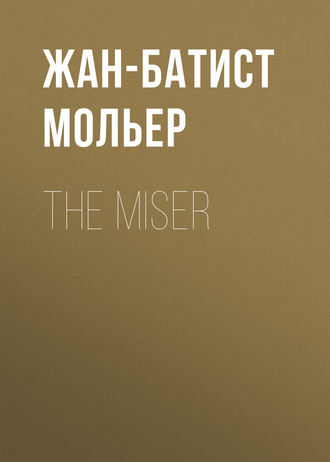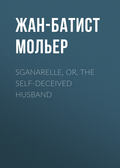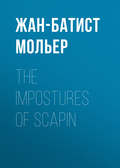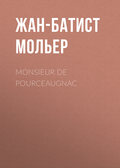
Мольер (Жан-Батист Поклен)
The Miser
Har. Tell me, Frosine, has Marianne seen me yet? Has she not noticed me when I passed by?
Fro. No; but we have had many conversations about you. I gave her an exact description of your person, and I did not fail to make the most of your merit, and to show her what an advantage it would be to have a husband like you.
Har. You did right, and I thank you very much for it.
Fro. I have, Sir, a small request to make to you. I am in danger of losing a lawsuit for want of a little money (Harpagon looks grave), and you can easily help me with it, if you have pity upon me. You cannot imagine how happy she will be to see you. (Harpagon looks joyful.) Oh! how sure you are to please her, and how sure that antique ruff of yours is to produce a wonderful effect on her mind. But, above all, she will be delighted with your breeches fastened to your doublet with tags; that will make her mad after you, and a lover who wears tags will be most welcome to her.
Har. You send me into raptures, Frosine, by saying that.
Fro. I tell you the truth, Sir; this lawsuit is of the utmost importance for me. (Harpagon looks serious again.) If I lose it, I am for ever ruined; but a very small sum will save me. I should like you to have seen the happiness she felt when I spoke of you to her. (Harpagon looks pleased again.) Joy sparkled in her eyes while I told her of all your good qualities; and I succeeded, in short, in making her look forward with the greatest impatience to the conclusion of the match.
Har. You have given me great pleasure, Frosine, and I assure you I …
Fro. I beg of you, Sir, to grant me the little assistance I ask of you. (Harpagon again looks grave.) It will put me on my feet again, and I shall feel grateful to you for ever.
Har. Good-bye; I must go and finish my correspondence.
Fro. I assure you, Sir, that you could not help me in a more pressing necessity.
Har. I will see that my carriage is ready to take you to the fair.
Fro. I would not importune you so if I were not compelled by necessity.
Har. And I will see that we have supper early, so that nobody may be ill.
Fro. Do not refuse me the service; I beg of you. You can hardly believe, Sir, the pleasure that …
Har. I must go; somebody is calling me. We shall see each other again by and by.
Fro. (alone). May the fever seize you, you stingy cur, and send you to the devil and his angels! The miser has held out against all my attacks; but I must not drop the negotiation; for I have the other side, and there, at all events, I am sure of a good reward.
ACT III
SCENE I. – HARPAGON, CLÉANTE, ÉLISE, VALÈRE, DAME CLAUDE (holding a broom), MASTER JACQUES, LA MERLUCHE, BRINDAVOINE
Har. Here, come here, all of you; I must give you orders for by and by, and arrange what each one will have to do. Come nearer, Dame Claude; let us begin with you. (Looking at her broom.) Good; you are ready armed, I see. To you I commit the care of cleaning up everywhere; but, above all, be very careful not to rub the furniture too hard, for fear of wearing it out. Besides this, I put the bottles under your care during supper, and if any one of them is missing, or if anything gets broken, you will be responsible for it, and pay it out of your wages.
Jac. (aside). A shrewd punishment that.
Har. (to Dame Claude.) Now you may go.
SCENE II. – HARPAGON, CLÉANTE, ÉLISE, VALÈRE, MASTER JACQUES, BRINDAVOINE, LA MERLUCHE
Har. To you, Brindavoine, and to you, La Merluche, belongs the duty of washing the glasses, and of giving to drink, but only when people are thirsty, and not according to the custom of certain impertinent lackeys, who urge them to drink, and put the idea into their heads when they are not thinking about it. Wait until you have been asked several times, and remember always to have plenty of water.
Jac. (aside). Yes; wine without water gets into one's head.
La Mer. Shall we take off our smocks, Sir?
Har. Yes, when you see the guests coming; but be very careful not to spoil your clothes.
Brind. You know, Sir, that one of the fronts of my doublet is covered with a large stain of oil from the lamp.
La Mer. And I, Sir, that my breeches are all torn behind, and that, saving your presence …
Har. (to La Merluche). Peace! Turn carefully towards the wall, and always face the company. (To Brindavoine, showing him how he is to hold his hat before his doublet, to hide the stain of oil) And you, always hold your hat in this fashion when you wait on the guests.
SCENE III. – HARPAGON, CLÉANTE, ÉLISE, VALÈRE, MASTER JACQUES
Har. As for you, my daughter, you will look after all that is cleared off the table, and see that nothing is wasted: this care is very becoming to young girls. Meanwhile get ready to welcome my lady-love, who is coming this afternoon to pay you a visit, and will take you off to the fair with her. Do you understand what I say?
Eli. Yes, father.
SCENE IV. – HARPAGON, CLÉANTE, VALÈRE, MASTER JACQUES
Har. And you, my young dandy of a son to whom I have the kindness of forgiving what happened this morning, mind you don't receive her coldly, or show her a sour face.
Cle. Receive her coldly! And why should I?
Har. Why? why? We know pretty well the ways of children whose fathers marry again, and the looks they give to those we call stepmothers. But if you wish me to forget your last offence, I advise you, above all things, to receive her kindly, and, in short, to give her the heartiest welcome you can.
Cle. To speak the truth, father, I cannot promise you that I am very happy to see her become my stepmother; but as to receiving her properly, and as to giving her a kind welcome, I promise to obey you in that to the very letter.
Har. Be careful you do, at least.
Cle. You will see that you have no cause to complain.
Har. You will do wisely.
SCENE V. – HARPAGON, VALÈRE, MASTER JACQUES
Har. Valère, you will have to give me your help in this business. Now, Master Jacques, I kept you for the last.
Jac. Is it to your coachman, Sir, or to your cook you want to speak, for I am both the one and the other?
Har. To both.
Jac. But to which of the two first?
Har. To the cook.
Jac. Then wait a minute, if you please.
(Jacques takes off his stable-coat and appears dressed as a cook.)
Har. What the deuce is the meaning of this ceremony?
Jac. Now I am at your service.
Har. I have engaged myself, Master Jacques, to give a supper to-night.
Jac. (aside). Wonderful!
Har. Tell me, can you give us a good supper?
Jac. Yes, if you give me plenty of money.
Har. The deuce! Always money! I think they have nothing else to say except money, money, money! Always that same word in their mouth, money! They always speak of money! It's their pillow companion, money!
Val. Never did I hear such an impertinent answer! Would you call it wonderful to provide good cheer with plenty of money? Is it not the easiest thing in the world? The most stupid could do as much. But a clever man should talk of a good supper with little money.
Jac. A good supper with little money?
Val. Yes.
Jac. (to Valère). Indeed, Mr. Steward, you will oblige me greatly by telling me your secret, and also, if you like, by filling my place as cook; for you keep on meddling here, and want to be everything.
Har. Hold your tongue. What shall we want?
Jac. Ask that of Mr. Steward, who will give you good cheer with little money.
Har. Do you hear? I am speaking to you, and expect you to answer me.
Jac. How many will there be at your table?
Har. Eight or ten; but you must only reckon for eight. When there is enough for eight, there is enough for ten.
Val. That is evident.
Jac. Very well, then; you must have four tureens of soup and five side dishes; soups, entrées …
Har. What! do you mean to feed a whole town?
Jac. Roast …
Har. (clapping his hand on Master Jacques' mouth). Ah! Wretch! you are eating up all my substance.
Jac. Entremêts …
Har. (again putting his hand on Jacques' mouth). More still?
Val. (to Jacques). Do you mean to kill everybody? And has your master invited people in order to destroy them with over-feeding? Go and read a little the precepts of health, and ask the doctors if there is anything so hurtful to man as excess in eating.
Har. He is perfectly right.
Val. Know, Master Jacques, you and people like you, that a table overloaded with eatables is a real cut-throat; that, to be the true friends of those we invite, frugality should reign throughout the repast we give, and that according to the saying of one of the ancients, "We must eat to live, and not live to eat."
Har. Ah! How well the man speaks! Come near, let me embrace you for this last saying. It is the finest sentence that I have ever heard in my life: "We must live to eat, and not eat to live." No; that isn't it. How do you say it?
Val. That we must eat to live, and not live to eat.
Har. (to Master Jacques). Yes. Do you hear that? (To Valère) Who is the great man who said that?
Val. I do not exactly recollect his name just now.
Har. Remember to write down those words for me. I will have them engraved in letters of gold over the mantel-piece of my dining-room.
Val. I will not fail. As for your supper, you had better let me manage it. I will see that it is all as it should be.
Har. Do so.
Jac. So much the better; all the less work for me.
Har. (to Valère). We must have some of those things of which it is not possible to eat much, and that satisfy directly. Some good fat beans, and a pâté well stuffed with chestnuts.
Val. Trust to me.
Har. Now, Master Jacques, you must clean my carriage.
Jac. Wait a moment; this is to the coachman. (Jacques puts on his coat.) You say …
Har. That you must clean my carriage, and have my horses ready to drive to the fair.
Jac. Your horses! Upon my word, Sir, they are not at all in a condition to stir. I won't tell you that they are laid up, for the poor things have got nothing to lie upon, and it would not be telling the truth. But you make them keep such rigid fasts that they are nothing but phantoms, ideas, and mere shadows of horses.
Har. They are much to be pitied. They have nothing to do.
Jac. And because they have nothing to do, must they have nothing to eat? It would be much better for them, poor things, to work much and eat to correspond. It breaks my heart to see them so reduced; for, in short, I love my horses; and when I see them suffer, it seems as if it were myself. Every day I take the bread out of my own mouth to feed them; and it is being too hard-hearted, Sir, to have no compassion upon one's neighbour.
Har. It won't be very hard work to go to the fair.
Jac. No, Sir. I haven't the heart to drive them; it would go too much against my conscience to use the whip to them in the state they are in. How could you expect them to drag a carriage? They have not even strength enough to drag themselves along.
Val. Sir, I will ask our neighbour, Picard, to drive them; particularly as we shall want his help to get the supper ready.
Jac. Be it so. I had much rather they should die under another's hand than under mine.
Val. Master Jacques is mightily considerate.
Jac. Mr. Steward is mightily indispensable.
Har. Peace.
Jac. Sir, I can't bear these flatteries, and I can see that, whatever this man does, his continual watching after the bread, wine, wood, salt, and candles, is done but to curry favour and to make his court to you. I am indignant to see it all; and I am sorry to hear every day what is said of you; for, after all, I have a certain tenderness for you; and, except my horses, you are the person I like most in the world.
Har. And I would know from you, Master Jacques, what it is that is said of me.
Jac. Yes, certainly, Sir, if I were sure you would not get angry with me.
Har. No, no; never fear.
Jac. Excuse me, but I am sure you will be angry.
Har. No, on the contrary, you will oblige me. I should be glad to know what people say of me.
Jac. Since you wish it, Sir, I will tell you frankly that you are the laughing-stock of everybody; that they taunt us everywhere by a thousand jokes on your account, and that nothing delights people more than to make sport of you, and to tell stories without end about your stinginess. One says that you have special almanacks printed, where you double the ember days and vigils, so that you may profit by the fasts to which you bind all your house; another, that you always have a ready-made quarrel for your servants at Christmas time or when they leave you, so that you may give them nothing. One tells a story how not long since you prosecuted a neighbour's cat because it had eaten up the remainder of a leg of mutton; another says that one night you were caught stealing your horses' oats, and that your coachman, – that is the man who was before me, – gave you, in the dark, a good sound drubbing, of which you said nothing. In short, what is the use of going on? We can go nowhere but we are sure to hear you pulled to pieces. You are the butt and jest and byword of everybody; and never does anyone mention you but under the names of miser, stingy, mean, niggardly fellow and usurer.
Har. (beating Jacques). You are a fool, a rascal, a scoundrel, and an impertinent wretch.
Jac. There, there! Did not I know how it would be? You would not believe me. I told you I should make you angry if I spoke the truth?
Har. Learn how to speak.
SCENE VI. – VALÈRE, MASTER JACQUES
Val. (laughing). Well, Master Jacques, your frankness is badly rewarded, I fear.
Jac. S'death! Mr. Upstart, you who assume the man of consequence, it is no business of yours as far as I can see. Laugh at your own cudgelling when you get it, and don't come here and laugh at mine.
Val. Ah! Master Jacques, don't get into a passion, I beg of you.
Jac. (aside). He is drawing in his horns. I will put on a bold face, and if he is fool enough to be afraid of me, I will pay him back somewhat. (To Valère) Do you know, Mr. Grinner, that I am not exactly in a laughing humour, and that if you provoke me too much, I shall make you laugh after another fashion. (Jacques pushes Valère to the farther end of the stage, threatening him.)
Val. Gently, gently.
Jac. How gently? And if it does not please me to go gently?
Val. Come, come! What are you about?
Jac. You are an impudent rascal.
Val. Master Jacques …
Jac. None of your Master Jacques here! If I take up a stick, I shall soon make you feel it.
Val. What do you mean by a stick? (Drives back Jacques in his turn.)
Jac. No; I don't say anything about that.
Val. Do you know, Mr. Conceit, that I am a man to give you a drubbing in good earnest?
Jac. I have no doubt of it.
Val. That, after all, you are nothing but a scrub of a cook?
Jac. I know it very well.
Val. And that you don't know me yet?
Jac. I beg your pardon.
Val. You will beat me, you say?
Jac. I only spoke in jest.
Val. I don't like your jesting, and (beating Jacques) remember that you are but a sorry hand at it.
Jac. (alone). Plague take all sincerity; it is a bad trade. I give it up for the future, and will cease to tell the truth. It is all very well for my master to beat me; but as for that Mr. Steward, what right has he to do it? I will be revenged on him if I can.







